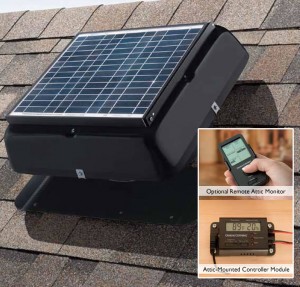 Owens Corning VentSure Solar Attic Exhaust Fan
Owens Corning VentSure Solar Attic Exhaust Fan
Your roof is a big investment and vital in protecting life’s most valuable assets – your home, memorabilia and family. To maximize the longevity of your roof, ensure proper ventilation for a healthier, more durable roof.
Typical household activities can wreak havoc on a roof and attic if proper roof ventilation is not provided:
• In the summer, heat build-up encourages the premature aging and cracking of wood and other roofing materials. Unwanted heat also can transfer back down into living areas – which reduces energy efficiency.
• In cold weather, warm air generated by laundry, showers, dish washing and cooking can linger in the house and leak into the attic, which may cause moisture build-up.
How Ventilation Works
In a balanced system, wind blowing over the ridge and roof vents creates negative pressure that draws the warmer air out of the attic. Replacement air then enters through the undereave or soffit vents, bathes the underside of the roof, and exits at the ridge cap through ridge, roof or gable vents. The natural convection action of rising warm air maintains a continuous air flow along the underside of the roof. Ultimately, proper ventilation – along with attic insulation – helps maintain a comfortable temperature inside a home, increase energy efficiency, helps prevent moisture damage and contributes to the longevity of a roof.
Ventilation Benefits
• Allows outside air to flow naturally upward and out of attic.
• Promotes a cooler, dryer attic.
• Helps prevent moisture from becoming trapped in insulation, structural wood, shingles and roof deck.
• Helps prevent rotting, mildew, drywall damage, peeling paint and warped siding.
• Provides year-round performance for consistent ventilation without energy consumption.
• Contributes to meeting criteria for high performing buildings, including LEED
Ventilation is an important component of a healthy roof. There are many types of ventilation products that will help prevent damage and premature aging caused by moisture in the winter and excess heat in the summer. One such roof ventilation product is a roof-mounted power vent.
Roof-Mounted Power Vent
You can relieve heat and humidity from your home’s attic, even on days with little or no wind, by installing a power vent to your roof. The air enters through intake vents and is pulled through and exhausted from the attic with electric fans, keeping your house cooler and drier while reducing potential problems such as rot, mold and ice dams.
